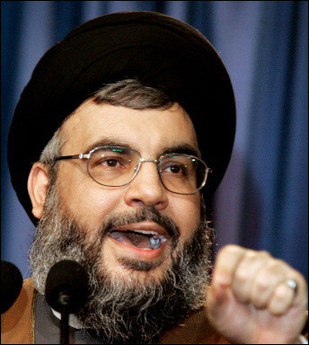 BEIRUT (Reuters) – Hundreds of thousands of Shi’ite Muslims in Lebanon turned a religious ceremony on Thursday into a peaceful protest against a series of cartoons in the Western media lampooning the Prophet Mohammad. The European Union sought to calm tension, calling for a voluntary media code of conduct to avoid inflaming religious sensibilities, while the United States accused Iran and Syria of deliberately stoking Muslim rage.
BEIRUT (Reuters) – Hundreds of thousands of Shi’ite Muslims in Lebanon turned a religious ceremony on Thursday into a peaceful protest against a series of cartoons in the Western media lampooning the Prophet Mohammad. The European Union sought to calm tension, calling for a voluntary media code of conduct to avoid inflaming religious sensibilities, while the United States accused Iran and Syria of deliberately stoking Muslim rage.
The leader of Lebanon’s Hizbollah group pledged no compromise until there was a full apology from Denmark, where the cartoons first appeared, and European countries passed laws prohibiting insults to the Prophet."Today, we are defending the dignity of our Prophet with a word, a demonstration but let (U.S. President) George Bush and the arrogant world know that if we have to … we will defend our prophet with our blood, not our voices," Sayyed Hassan Nasrallah, the leader of Hizbollah, told the crowd.
The annual Shi’ite mourning ceremonies mark the death of the Prophet’s grandson, Imam Hussein, killed in Kerbala in Iraq 1,300 years ago. Security sources put the turnout in Beirut at 400,000 and similar processions are due throughout the day in other Shi’ite centres; notably in Iraq and Iran.
Aid workers from Denmark were told to stay away from the ceremonies for fear of reprisals, said the Danish Red Cross, which has some 40 Danish staff in Muslim countries. Denmark’s Foreign Ministry warned Danes to stay away from Lebanon.
BLASPHEMY OR FREE SPEECH?
Publication of the cartoons, one of which showed the Prophet wearing a turban shaped like a bomb with a fizzing fuse, has incensed Muslims across the world and led to often violent protests in which at least 11 people have been killed.
Muslims consider any portrayal of their Prophet to be blasphemous, but the publishers of the cartoon, reprinted across Europe and in other parts of the world, have insisted they were just exercising their right to free speech.
The 25-member EU called for the media to adopt a voluntary code of conduct to avoid a repeat of the furor.
By doing so, "the press will give the Muslim world the message: We are aware of the consequences of exercising the right of free expression," European Justice and Security Commissioner Franco Frattini told the Daily Telegraph newspaper. "We can and we are ready to self-regulate that right."
The EU’s foreign policy chief Javier Solana is to travel to Muslim countries to try to calm some of the anger.



